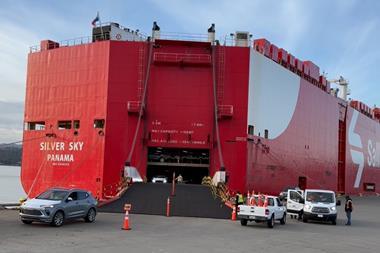
Ocean car carriers Mitsui OSK Lines (MOL) and Höegh Autoliners have decided to consolidate their short sea shipping and feeder operations in Europe with the formation of a 50-50 joint venture, Euro Marine Logistics (EML), which integrates the existing European short sea and logistics activities of both companies as well as Euro Marine Carrier (EMC) and Nissan Motor Car Carriers (NMCC), entities in which the two companies are shareholders.
EML started trading in the second week of June and by the third quarter of 2011 will operate 13 vessels in European waters with a mixture of pure-car and pure-car-and-truck carriers, according to Mark Pauwels, the new managing director of EML.
EML is currently serving the existing customer portfolio from the previous structure. EML will also be involved in the feeder activities on behalf of the considerable deep-sea activities of its owners, according to Pauwels.
“EML has the ambition to offer its services to the entire market,” he said.
According to the company’s official statement, EML will be among the top three vehicle short-sea operators in Europe. Pauwels added that the company anticipates adding new capacity from 2012.
While the company intends to develop in the high-and-heavy and project cargo space, it has no plans in the immediate future to operate in the loaded trailer market or to carry passengers or drivers, according to a spokesperson from Hoëgh Autoliners.
The joint venture, which adds no new capacity to the market, represents a consolidation in the European short-sea industry as well as a deeper integration between the partnerships already in place between MOL and Höegh, both of which are primarily deep-sea carriers. The two companies are already the joint shareholders in NMCC as well as its subsidiary, EMC, whose operations have now been absorbed by EML.
According to the Höegh Autoliners spokesperson, the decision to form a joint company rather than ‘going it alone’ was influenced by the volatility in the market. “There are advantages to both [a joint venture or a separate company] but given that this is very much a continuation of what has been, cooperation was the more natural path to follow,” the spokesperson said. “Shipping is cost intensive and the markets have been and are volatile, and the cooperation alternative also offers less risk.”
EML’s Pauwels also said that the joint venture was a move towards consolidation, with the combined service offering a sign of the tough competition seen not only within the short-sea sector, but of its competition with road and rail transport. “European short sea is an extremely competitive environment in which carriers don’t only compete against each other, but also [against] the other modes of transport,” Pauwels told Automotive Logistics. “The recent crisis also produced additional pressure on the freight levels.
“Setting up this JV company must be seen as an exercise of consolidation and rationalisation to cope with the challenges of the European short sea [market].”
The European shipping sector has faced not only tough market conditions and rising bunker costs, but will also face increasing regulatory costs. By 2015, much of the Baltic and North Sea will be part of an emission control area that will mandate the fuel sulphur content to drop from 1.5% to 0.1% (read more here), a move that shipping lines say could more that double fuel costs from current levels.



































